Having the best campervan heaters to keep you warm is essential to van life. Find out which heaters we recommend for your van.
Any experienced camper or van lifer knows how crucial it is to have a campervan heater in winter. Not only does a heating system allow you to stay nice and warm during the chilly evenings, but it also opens up a world to other cold or snowy destinations that you couldn’t have visited otherwise.
When it comes to van life accessories, anything that keeps you warm on cold nights is a huge bonus!
Finding the best campervan heater for your van can be tricky, especially with so many different companies, models, and styles to choose from.
Should you invest in a hot air furnace that can run through the night? Or would you rather buy something portable that doesn’t take up much space in your van?
Not only should you choose something that’s safe to use, but you’ll also need to make sure the heat source is energy and cost-efficient to help you stay warm through the winter.
PRODUCT | WHAT WE LIKE | THINGS TO CONSIDER | |
BOVADO COMFORT HEATER EDITOR'S CHOICE |
|
| |
CAR COZY 12V ELECTRIC BLANKET |
|
| |
WEBASTO AIRTOP 2000 STC DIESEL HEATER |
|
| |
ESPARSPRACHER ESPAR AIRTRONTIC D2 AIR HEATER |
|
| |
PROPEX HS2000 BLOWN AIR HEATER |
|
| |
MR. HEATER F232000 PROPANE HEATER AFFORDABLE CHOICE |
|
| |
CAMCO WAVE 8 CATALYTIC HEATER |
|
| |
CB-1008 CUB CUBIC MINI WOOD STOVE BEST WOOD STOVE |
|
| |
KIMBERLY SMALL WOOD STOVE |
|
|
From mini wood-burning stoves to plug-and-go electric heaters, there are dozens of heating options on the market today.
In this article, we’ll teach you what to look for when purchasing heaters and help you choose the best one for your camper van.
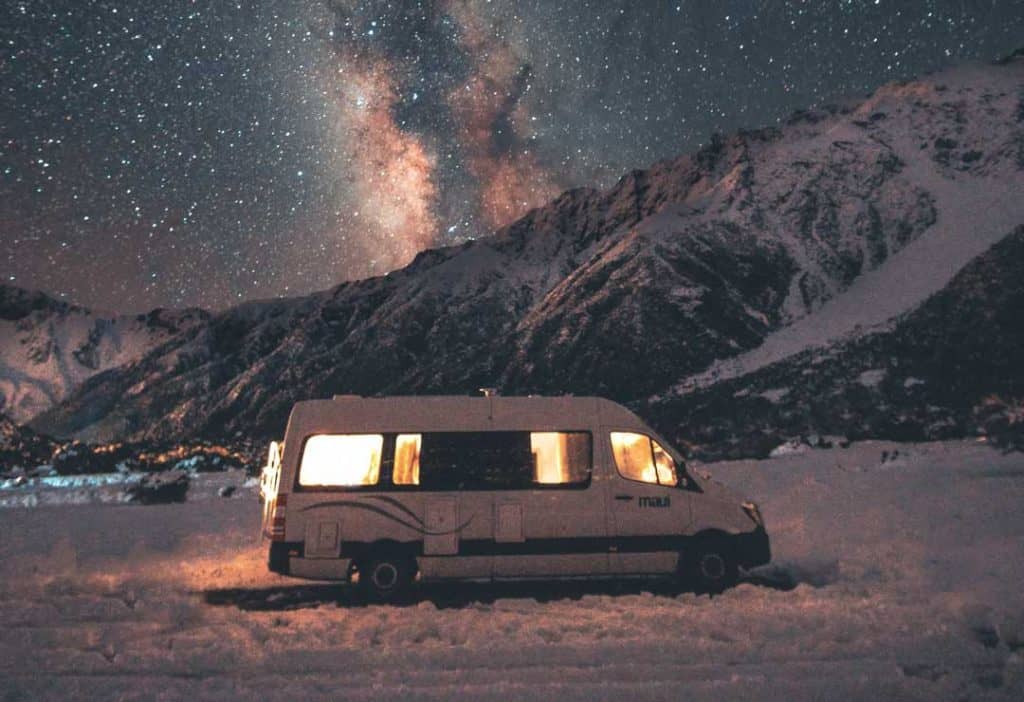
The Best Campervan Heaters
We’ve scoured the globe for the best campervan heaters available for purchase.
Our list takes into account numerous factors, including purchase price, ease of installation, operating costs, and energy efficiency.
Bovado Comfort Heater
In terms of ceramic electric heaters, the Bovado Comfort Heater is considered the best on the market. Despite it’s small and compact size, this space heater can easily heat up your entire RV and campervan in just a few minutes. Because there’s nothing to install, it’s widely regarded as a great electric heater for first-time van lifers.
The thermostat and fan settings can be adjusted using the two manual control nobs on the top. Even when it’s been running for a while, the body of the heater doesn’t heat up, so it’s easy to pick up and transport. Best of all, the built-in overheating protection shutoff adds an extra layer of security if you plan on running the unit at night.
Keep in mind that the Bovado does require an electric power source, which might be difficult for off-the-grid travelers looking for a heater for a campervan.
| PROS | CONS |
|---|---|
| * Little, compact and affordable * Easy to operate * Overheat protection | * Doesn’t shut off when knocked over * Requires a wall outlet power source |
Car Cozy 12V Electric Blanket
The super comfy Car Cozy 12V Electric Blanket is just as soft as it is warm. Made out of soft, polyester fleece, this electric heater blanket can easily plug into any van 12V power outlet. It’s large enough to be used by two people as a sleeping blanket, although it’s also a great option just for wrapping it around you for extra heat in the winter.
At night, you’ll also have the option to set a 30 or 45-minute timer that will automatically shut off. Whether you’re traveling without an electric hookup or simply looking for a simple and affordable way to stay warm during your road trip, then look no further than the plush Car Cozy Blanket.
Keep in mind that electric blankets have a relatively small heat output. They cannot be used to heat an entire cabin or room in your campervan.
| PROS | CONS |
|---|---|
| * Plugs into any 12V cigarette lighter * Affordable * Safety timer and shut-off | * Only heats a small area (not the entire van) |
Webasto Airtop 2000 STC Diesel Heater
Although it’s not the most wallet-friendly heater on this list, the Webasto Airtop Diesel Heater is considered one of the highest-rated diesel heaters by many people in the van life community. This diesel heater consumes very little fuel (0.12 – 0.24 liters of fuel per hour of heater output) while still providing your campervan with a constant, powerful source of heat. The built-in temperature control rheostat also guarantees that your van cabin remains at the ideal temperature throughout your entire journey.
The Webasto kit comes with everything you need for vehicle installation, although it’s recommended to hire a professional to install it correctly.
| PROS | CONS |
|---|---|
| * Cost and energy-efficient when using * All-inclusive kit * Powerful for winter | * Pricey * May need professional installation |
Esparspracher Espar Airtrontic D2 Air Heater
When it comes to finding a gas heater to warm up inside the van, it doesn’t get much better than the Espar Air Heater. With just one gallon of diesel fuel, you can run the van heater for almost 24 hours, which makes it one of the most energy-efficient diesel heaters we’ve seen in a campervan. The built-in digital display makes it easy to monitor, and the adjustable nighttime mode means it’s much quieter than other gas and air heaters.
We know that one of the biggest problems with gas heaters is that they tend to be temperamental when operating in places with high altitudes. Fortunately, you can upgrade your Espar and install a high altitude sensor and pump to make the most of your mountainous journey.
| PROS | CONS |
|---|---|
| * Energy and cost-efficient * Optional quiet mode * Easy to use and understand display | * Must be cleaned every year for carbon build-up * Expensive to buy and install |
Propex HS2000 Blown Air Heater
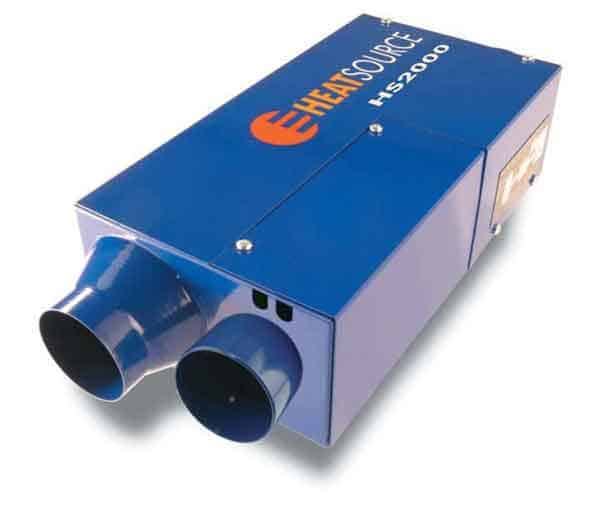
Despite the initial cost investment and intricate installation process, the Propex HS200 is one of the most energy-efficient air heaters for RVs and camper vans. This furnace uses propane and can be mounted under the van floorboards or inside an interior cupboard, and doesn’t require any connection into your fuel tank.
The heating automatically adjusts to your desired temperature and uses minimal electric energy that won’t drain your van battery. If the heater gets too hot or encounters another problem while running, it will instantly turn off, protecting you from potentially dangerous issues.
If you’re planning on running the hot air well into the night, you might want to stock up on several tanks of gas propane for your fuel supply.
| PROS | CONS |
|---|---|
| * Inconspicuous design that can be hidden * Low energy consumption | * Must be installed with ventilation flue * Can burn through propane tanks faster than other heaters |
Mr. Heater F232000 Propane Heater
It’s easy to see why Mr. Heater has become one of the best selling propane heaters for campervans. Although it’s portable (it comes with a handle and only weighs nine pounds), this small unit has a heat output of 450 square feet in as little as a few minutes. And it’s durable construction means that it can be used inside or outside, so you can stay warm around the campfire or inside your van.
Safety-wise, the gas heater has an automatic shutoff system if the oxygen levels become too low. It also includes an accidental safety shutoff system in case it tips over while in use. This propane heating system has low, medium, and high settings, so it’s easy to use even for first-time heater owners.
| PROS | CONS |
|---|---|
| * Can be used indoor and outdoor * Safety shutoff features * Great company reputation | * Uses a lot of propane on the highest level * May not work in high altitudes above 7,000 feet |
Camco Wave 8 Catalytic Heater
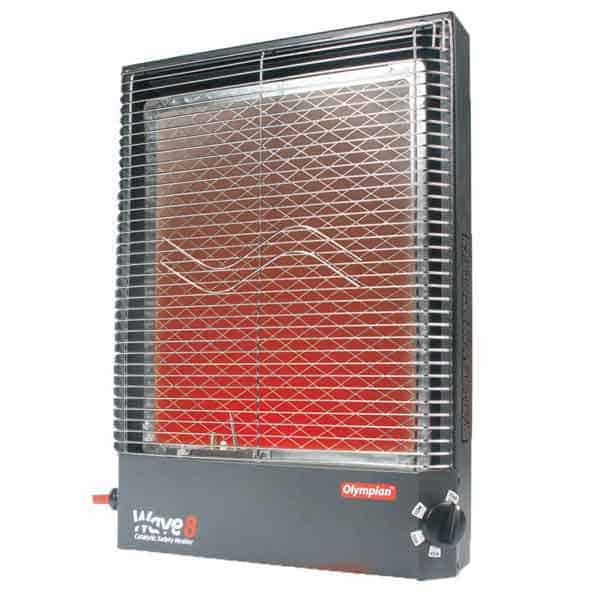
The Camco Catalytic Heater is a unique wave heater that uses a flameless radiating technology to heat spaces up to 290 square feet.
It operates on low-pressure fuel, making it a budget-friendly option that doesn’t require electricity or additional battery sources. There’s no fan or blower inside, which means you can enjoy the blissful sounds of nature without being distracted by annoying buzzing sounds created by other loud heaters.
Although it’s good for small spaces, the Camco Catalytic Heater might struggle in extremely cold climates or in an RV with little to no insulation.
| PROS | CONS |
|---|---|
| * Energy and cost-efficient * Silent * Safety shutoff valve | * Does not disperse well in freezing temperatures |
CB-1008 CUB Cubic Mini Wood Stove
The adorable Cubic Mini Wood Stove is the perfect heating unit for a small campervan with low ceilings.
Although the wood heater itself is small (11 inches wide and 12 inches high), the dry heat output can warm a cabin that’s roughly 200 square feet in size. Besides providing heat, you can also use the heater for cooking inside your van, which in our opinion, is a huge bonus.
The design of the mini stove is also aesthetically pleasing and would look good in both traditional or modern RVs and campervans. If you’re looking for an attractive RV wood stove heater that’s cost-efficient and easy to use, then the Cubic Mini Stove might be the best option for you.
| PROS | CONS |
|---|---|
| * Attractive design * Small and compact * Cheap to heat and run (only uses wood) | * Requires 3” double-wall flue pipe for proper ventilation * Can only heat spaces with low ceilings |
Kimberly Small Wood Stove
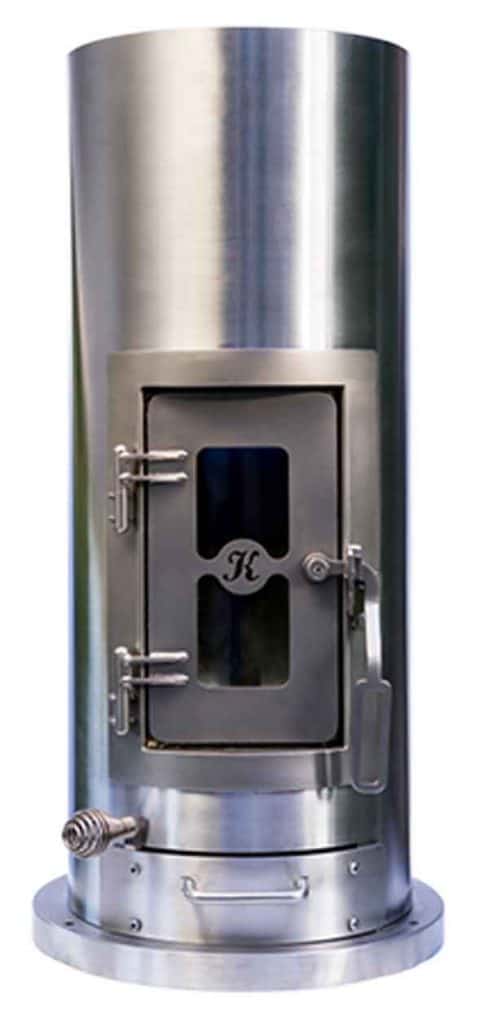
The EPA-certified Kimberly Small Wood Stove will make a cozy addition to your camper van vehicle. This small wood-burning heater packs a big punch – it can heat a cabin or room up to 1,500 sq ft and can burn for up to 8 hours on one load of dry heat wood (although you can always adjust the amount of heat to suit the exact size of your campervan). Best of all, there are no moving parts of electrical components, so you can still have a heat source even if you’re camping without shore power connections.
Although the cost of the Kimberly stove is quite expensive in comparison to other wood, propane, or diesel heaters, its functional design and low per hour emission output make it a worthwhile investment for your van. It’s also incredibly easy to set up, which means you’ll save big bucks on professional heating installation costs.
| PROS | CONS |
|---|---|
| * EPA-certified and CSA-certified at 3.2 grams/hour emissions * Temperature is adjustable to size and space * Built-in cook-top surface * Attractive design | * One of the most expensive van life heaters * Requires floor space and chimney ventilation |
Choosing the Best Campervan Heaters
If you haven’t already decided which kind of campervan heater is best for you, we’ll give you a little perspective in this section of what you should consider when shopping.
Many factors like price, operating cost, installation, fuel type, fuel consumption are taken into account before choosing the best heaters.
Types of Campervan Heaters
Let’s dive deeper into the best heaters for van life.
12V Electric
Electric heaters are some of the most popular options for heating a campervan. They come in many different styles and models, like ceramic space heaters, tower heaters, infrared heaters, and oil-filled heaters.
They usually don’t emit any smell, which means they are safe to use in small spaces like campervans. In addition, they’re usually lighter and more affordable compared to other types of van life heaters.
On the other hand, a lot of energy is required to power electric heaters, which shouldn’t be a problem if you’re hooked up to shore power. If you are traveling on the road for an extended period of time, you might consider opting for an electric blanket that plugs into the cigarette lighter instead of a normal electrical system.
12v heaters are an ideal option for a small campervan because they are inexpensive, small, and produce enough heat to keep the van cozy. And while a blanket isn’t the best for heating an entire room, it can still provide heat during the night.
Remember, when using anything 12-volt in your van you will want to make sure you have an adequately sized battery bank and perhaps a battery monitor for peace of mind knowing that you can fall asleep running your heater without damaging the batteries.
120V Electric Heaters
120V heaters are the big power consumers. They are the better performer but consume a crazy amount of electricity.
Even if you have a large battery bank and a sizeable inverter, operating them with the van’s battery is a bad idea if you are out for a long time. They consume so much energy that they will draw your batteries down to unsafe levels in no time. Using it with shore power is the better choice.
Gasoline and Diesel
A gasoline and diesel heater is one of the most popular options for van life campers. Diesel and gas heating units are usually installed under the driver or passenger seat.
Because it connects directly to the fuel tank, one of the main benefits is that the heat simply uses the fuel or diesel gas that you already have stored in your van (although some of them do require a bit of electricity from your cabin battery).
Although the upfront costs of installing gasoline or diesel heaters can be pricy, they tend to one of the cheapest solutions in the long run. Not to mention, you can easily fill up on fuel at gas stations along your road trip route.
This type of efficient diesel heater is especially useful if you need to camp off the grid for an extended period of time.
Check out our top recommendations for the best diesel heater for van and RV life.
Propane
If you don’t mind lugging around a propane tank, then a propane heater could be the right solution for your camper van needs. Propane tanks are relatively inexpensive and can be found at most petrol stations or grocery stores.
The tanks can also be hooked up to other camping appliances besides heating, which is an added bonus, such as a portable propane fire pit.
Propane heaters are a popular heating system for van lifers and campers. The running cost of propane heaters is much cheaper than the electrical heaters. Moreover, propane gas is abundantly available and it’s likely you’ve already incorporated a robust propane system into your campervan build.
A propane heater uses radiant heat to spread the warmth. Some heaters also have a fan for effective and faster heat distribution. You can also get a portable propane tank to make them more versatile.
The heaters use proper combustion for heating, so the heat output can be hazardous in some cases. So, it is essential to have a carbon monoxide detector and proper ventilation to avoid any mishap.
Propane heaters are great options for short or long-term van lifers. If you’re spending a lot of time on the road, you can also invest in a propane furnace that can generate a lot of heat for your vehicle.
As a side note, it’s crucial to carry a gas detector or carbon monoxide detector if you are using propane heaters in your campervan. The tank should also be stored outside your vehicle, as bringing it inside a closed space can be extremely dangerous.
Many propane heaters have a high condensation level while burning the propane, which means a good source of ventilation is also required.
Wood Stove
There’s something comforting about cuddling around a cozy, wood-burning stove in the middle of autumn or winter. These heaters only require a little bit of chopped wood, which produces a dry heat that is efficient and inexpensive (or even free) to operate in your campervan.
Many RV owners agree that having a wood heater will save you money on heat costs in the long run, especially compared to propane heaters and diesel heaters. However, time and cost investment to set up a wood-burning system deters many owners from purchasing one.
In addition to the stove itself, you’ll also be required to purchase additional equipment like a vent pipe, chimney cap, humidity monitor, and a heat-powered fan.
Power Source
First and foremost, a heater’s power source is an important consideration when shopping for a camper van heater. As discussed above, it can be electric, diesel, propane, or wood, depending on the choice you make.
Pick a device that will perfectly fit your van. For example, if the campervan doesn’t have proper ventilation, then go for an electric heater. If the ventilation is good, then you can choose between propane, diesel, or wood stove. But keep in mind wood heaters can be oversized for a small camper.
So, consider all aspects of your van before choosing a heater based on its power source.
Ease of Use
How easy or hard is it to use and maintain a heater? Can a newbie or a person with a bit of knowledge maintain the heater?
Propane and electric heaters are easy to use and maintain, the controls are straightforward, and fault tracing is not tricky. In contrast, diesel heaters are complicated to maintain because those heaters are like mini engines.
And do you feel comfortable running a propane heater through the night? Or would you prefer the simplicity of an electric blanket?
There are lots of things to consider for each option and we recommend that you look back through the pros and cons of any option you are considering.
Time to Heat Space
How much time does it take to heat the van? This is another crucial criterion to consider before buying camper heaters.
You will not only consider the time taken but also how efficiently it can maintain a particular temperature?
For example, the Kimberly Tiny Wood burner can rapidly heat the camper van but maintaining a temperature is difficult. While electric heaters will take some time to heat the space, but they can efficiently preserve constant temperature.
Campervan Heating Safety Tips
There are several risks associated with using a heater in your camper van. Electric, wood, propane, and gas heaters all pose major safety hazards that you should be aware of.
First and foremost, it’s important to avoid potential fire hazards by not blocking vents or installing the heater near anything flammable. It’s also a good idea to avoid putting anything directly on or near the heater, like socks or blankets.
Electric heaters and wood-burning stoves can easily tip over and start fires, even if they aren’t giving off much heat. In case of this type of emergency, you will also want to make sure you have a fire alarm and fire extinguisher on board at all times.
It’s also crucial to have a carbon monoxide detector in your van. Although the risk of poisoning is higher with a propane or diesel tank, having a detector is always important when traveling in a campervan. Other heat systems require proper ventilation, whether that’s a cracked window or a built-in flue pipe.
Wrapping Up
Van life is full of decisions. This is especially true if you are planning a camper build and you must think through any appliances, such as heaters, that may require more permanent installation.
Although we are big fans of propane furnaces due to their heat production, the fact we run other appliances off of propane as well and they have a more accurate thermostat, the best option for anyone in van life is Mr. Heater.
Fuel it with two 1 lb canisters or a larger container. Keep it indoors or share the warmth with friends outside while you enjoy the night sky. By far the most popular and useful heater option for van life is Mr. Heater.
This post may contain affiliate links. That means if you make a purchase a product we recommend using the links in this article, we may receive a small commission at no extra cost to you. We promise to use this pocket money to buy lots of coffee and fuel for the campervan to keep us enjoying #VanLife for just a little longer. We appreciate your support, and only recommend products we know and trust. Thank you friends!







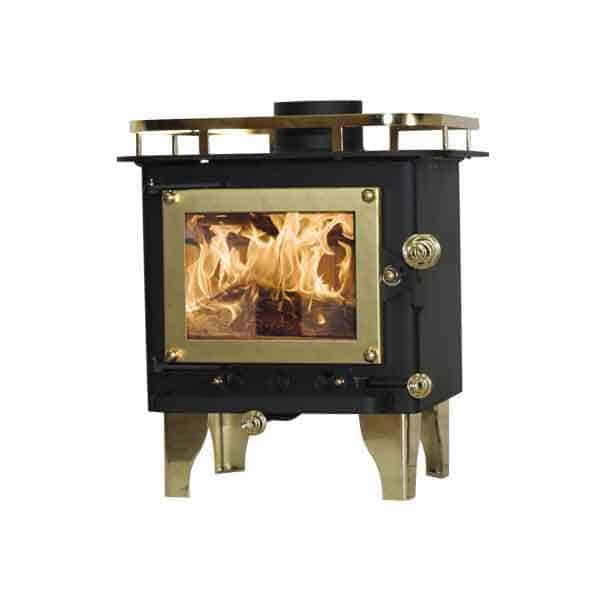


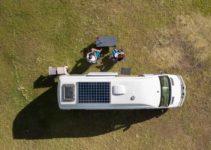
![The 4 BEST RV Wood Stoves – Ultimate Buyers Guide [2024]](https://vanlifetheory.com/wp-content/uploads/2021/10/RV-Wood-Stove-Feature-211x150.jpg)
![19 BEST Campervan Accessories [2023 Van Life Essentials]](https://vanlifetheory.com/wp-content/uploads/2020/08/Fairy-Lights-211x150.jpg)